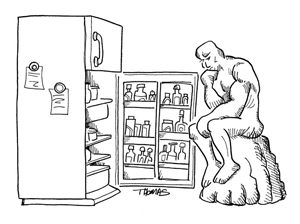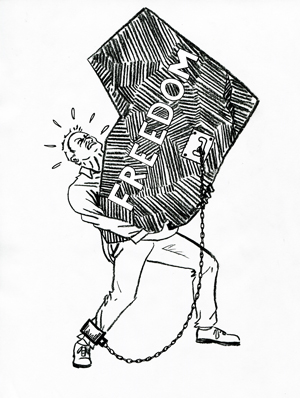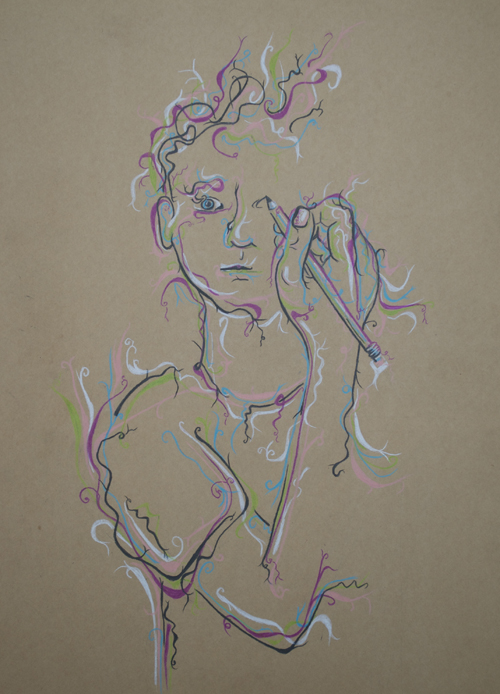
Your complimentary articles
You’ve read one of your four complimentary articles for this month.
You can read four articles free per month. To have complete access to the thousands of philosophy articles on this site, please
Existentialism
On Being An Existentialist
Stuart Greenstreet chooses to tell us how to become authentically existentialist.
It took almost a century of thought before existentialism came to fruition as a popular movement – almost a craze – in post-war France in the nineteen-forties and fifties. This was the time of its greatest influence, not only on philosophy but also on literature, drama and film-making, extending far beyond France. But here I am dealing with existentialism solely as a school of philosophy – one which arose mainly from the work of five men and one woman: Søren Kierkegaard, Friedrich Nietzsche, Edmund Husserl, Martin Heidegger, Jean-Paul Sartre, and Simone de Beauvoir. (Although Albert Camus is often called an existentialist, he himself denied he was one [see later, ed].) Of these, Sartre was the only one to accept the name ‘existentialist’ and employ all of its key concepts: ‘anguish’, ‘bad faith’, ‘facticity’, ‘commitment’, and ‘authenticity’.
All philosophers in the existentialist camp shared the same mission: to make us recognise that human beings are free to choose, not only what to do when faced with moral choices, but what to value and how to live. They want these facts about human freedom to be not merely accepted, but absorbed by each person for him- or herself, so that when they have absorbed them their whole view of life will be different. Existentialism as a cultural movement belongs to the past. But as a philosophy with this utterly practical mission it can be as liberating to us now as it was to men and women in war-torn Europe.
Basics

Cartoon © Thomastoons/Bill Thomas 2016. Please visit thomastoons.wix.com/cartoons.
When readers of the Parisian newspaper Le Monde began to take notice of existentialism, the newspaper published an article in December 1945 to tell them what it meant. Although it did its best, Le Monde finally felt it had to admit that “Existentialism, like faith, cannot be explained; it can only be lived.”
Why is existentialism like faith? Because to base one’s conduct on a belief that one is free to choose is an act of faith, for there’s no way of knowing for sure whether it’s true or false. And what makes existentialism hard to explain? Perhaps it is its claim that no objective moral order exists, independently of humanity. That makes it futile to seek a code for behaviour anywhere outside of ourselves. Each individual has to create his or her own value by living and affirming it, and must do so in a way that satisfies a single governing norm of ‘authenticity’ – in perhaps oversimplistic terms, through always ‘being myself’.
Existentialism is obsessed with how individuals choose to live their lives. Our choices are demonstrated by our acts, and always concern matters within our power. To choose, then, involves deliberating about things that are in our control and attainable by our action. Then by whatever actions we choose to take, we define and create the selves that we gradually become. For example, we become ‘just’ by performing just acts, and similarly as regards other virtues. This is not meant as a moral point – no ‘should’ or ‘ought’ is implied – but as a fact about the nature of the world and of human choice: that my choices of good or evil will determine my character and make me the kind of human being that I turn out to be.
Authentic Being
Existentialism obviously rests on some pretty bold ontological assumptions, then – claims about what exists and how it exists. The first is that values are not part of the fabric of the world, in the sense of existing independently of us. To live your life as if your values were somehow given from outside, as though to adopt the attitude of an uptight, conventional person whose duties all seem to be laid out for them, would amount to a refusal to face up to your freedom. In that case, you wrongly think you can escape your freedom by taking refuge in a fixed role, or essence. But even when people do passively adopt ready-made values in this way, they still choose to do so, albeit in a way that has failed to live up to the standard of authenticity, because it doesn’t recognise their inalienable freedom.
My attitude is authentic when I engage in my projects as my own. My attitude would not be authentic if keeping my promises, for instance, is something I do just because that’s ‘what one does’ – what ‘moral people’ normally do – or because it is what society expects of me. My way of behaving is authentic if and only if my action is a reflection of my choice – that is, when I commit myself to behave in that sort of way because that is what I expect of myself whether or not it is socially sanctioned.
Choosing Value
Existentialism makes every individual responsible for deciding for him- or herself how to evaluate their choices. Sartre further remarked that it is in the nature of values that they make demands on us. I do not just see the homeless person; I encounter him as someone ‘to be helped’. Why ought I help the homeless? The answer can be revealed, Sartre thought, only to a free agent who makes the value exist by the fact of recognizing it as such. You judge a homeless man as someone to be helped only because you have already chosen yourself as a person who helps people. There is an answer to ‘Why ought I help the homeless?’ from within that prior ‘self-making’ choice; but outside of it there is none. Moreover, the principle of helping – say kindliness or compassion – is sanctioned by your action, rather than the action by the principle.
To value a certain way of acting more highly than any alternative is to choose that particular way as a goal – to set it up as an ideal to be aimed at. For although the values you adopt are indeed your values, they do not merely express your private feelings about what is right or wrong. If in some particular instance you judge that tax evasion is wrong then, whether you realise it or not, you have judged that it is wrong in general. For the concept of ‘choice’ entails the idea of whatever is chosen is the right thing to do, and ‘right’ means ‘right for everyone’. As Sartre put it, “when a man chooses for himself he chooses for mankind” (Existentialism is a Humanism, 1946) – meaning that every action that he (and we) choose provides an example for the rest of humanity. If I choose a particular good for myself such as freedom, I am thereby committed to choosing freedom for everyone.
The Facts of Freedom

Condemned To Be Free © Peter Pullen 2016. Please visit www.peterpullen.com.
Existentialism’s most basic premise is that human beings have no pre-existing or set nature or character. We are not essentially anything, except that we are essentially free. We become self-created beings by virtue of our actions and our relations with other people. Hence the existentialist slogan ‘existence precedes essence’.
That each one of us has absolute freedom of choice is an existentialist article of faith – to the existentialist it is a truth so self-evident that it never needs to be proved or even argued for. And who needs theoretical proof of something indispensable to the practical business of living? To an existentialist, “My freedom is my essence and my salvation. I cannot lose it without ceasing to be” (Roger Scruton, Modern Philosophy, 2012). So every honest person must recognize my freedom.
Obviously no one chooses entirely what he or she becomes, or is. Each of us has a set of given natural and social properties that influence the kind of person we become. Sartre gave to these features the collective name ‘facticity’. One’s facticity comprises all those properties another person could discover and investigate. They include natural properties, such as sex, weight, height, and skin colour; social facts, such as race, class, and nationality; psychological properties, such as my extant web of beliefs, desires, and character traits; and historical facts, such as my family background, schooling; and so forth.
Our own facticity hardly ever occupies our own minds in this third-person kind of way, even though it does weigh on us and colour our moods and approach to life. However, when I do step back and take a third-person, objective, view of my facticity, then these given facts about me may strike me as precisely what does define who I am. But for an existentialist, to think this would be a radical mistake, not because my factual properties are misleading, but because the person each one of us is cannot be defined in third-person terms. No objective account of my properties could ever describe my subjective experience of what it’s like to be me, the person who has them. So someone observing me can make out my skin colour, class, or ethnicity; but the moment he attempts to identify me in terms of these properties, he encounters a paradox, since the kind of being I am is defined, among other things, by the attitude I adopt towards my own facticity – by how I choose to interpret it – and that is not fixed by the facts. Who I am depends (among other things) on what I make of my facticity, on how I try to go beyond, or transcend it. In other words, whatever my facticity, and no matter how fixed it may be, it does not curtail my freedom. I am still free to decide what values to ascribe to my facticity, and what stance to take towards it. To become the person you choose to be despite the burden of your facticity is the only authentic way to live your life, whereas to live it as though you were at the mercy of your facticity – to pretend that it has robbed you of your freedom – is inauthenticity. It would be to lose both one’s autonomy and one’s integrity, and in this way give in to determinism.
The Price of Freedom
It would be hard to feel otherwise about freedom and choice if you had lived in occupied France between 1940 and 1945, when existentialism came of age as the philosophie officielle of the resistance movement. In those years, and even during the post-1945 reconstruction, it exerted a powerful appeal that was as much emotional as intellectual. If “man is nothing but that which he makes of himself” (Sartre), then no one is bound by fate, or by forces outside their control. By uniting with like-minded people, the individual can challenge authority – even tyrannical power – and change things. He or she can choose to oppose the Nazis, or to create a more just society than had existed before the war. Only by exercising their personal freedom could people regain their civil liberties.
But there is a price to be paid for the freedom to do whatever you choose at every juncture. No one can decide on your behalf; the choice of action is always yours and yours alone. And no one can ever avoid the personal responsibility for judging what the morally right thing to do is. You thus suffer the potential anguish of having to endure an endless series of choices in the knowledge that only you can decide, that you may evaluate anything as you please, and that you have no character to guide your choice other than the one you’re forming for yourself.
Not everyone can cope with the burden of an existentialist approach to shaping their lives and characters. Some may try to flee the tyranny of choice by hiding from themselves the truth that we are all, as Sartre said, “condemned to be free” – which means not free to cease being free. All our acts inevitably presuppose choice; and so we are still choosing even when we think we are not – even when we have deliberately chosen not to choose.
When France was over-run and occupied by the German army in 1940, every French man and woman was forced to think about their values and decide whether to resist and struggle to free their country, or to resign themselves to Nazi domination. They had to choose, and it was a time when they faced their freedom in great anguish. Some were unable to bear the thought of their freedom, and in order to escape its pressure adopted the cover of what Sartre called ‘bad faith’, perhaps the most important concept of his philosophy. (Note how he too turned to the word ‘faith’.) Someone is in bad faith when, in order to protect himself from the anxiety of having to choose, he pretends to himself that he is not as free as he actually is. It is a specific kind of self-deception, a core betrayal of one’s self.
A common type of bad faith is the denial of one’s freedom in the form of an excuse, typically beginning with “I couldn’t help it…” We hear this in the excuse made by those Nazi soldiers who insisted “I could not do otherwise” or “I was just doing my duty.” One can always do otherwise: one can quit, or run away, or even choose to be shot. The cost might enormous – even one’s life – but it is never a case of cannot, always of will not. They chose to continue to obey orders: it was not determined by their nature. Existentialism doesn’t allow excuses. There is never a legitimate reason for denying one’s freedom. No matter how oppressed we may be by our situation or circumstances, we know we can always imagine alternatives – and act on them too, if we’re brave enough. The only way to stay in good faith is honestly to continually own up and respond to being free to choose, and accountable for whatever you decide to do.

Creating Yourself Elizabeth Bevington 2016
Thinking & Living
I detect in the language I use here the characteristic ‘missionary’ tone of existentialism, which implores us all to experience our freedom to choose, and to practice it. Existentialism is a coherent theory rooted in an idealist (that is, a consciousness-based) metaphysics; but it is not enough merely to understand it intellectually in that way. To grasp it properly, one has to engage with it as a practical and committed philosophy – in other words, to commit to being an existentialist. Then you would see yourself as free and autonomous in way you did not recognize before, and by so doing acquire the power to transcend your facticity.
‘Facticity’ and ‘transcendence’ are the grand concepts of existentialism. Our facticity defines our situation and who we are up to this point in our lives. Transcendence opens up the world of possibilities: what we can now go on to make of that situation and of ourselves, given who or what we have become so far.
Existentialism is absolutely not ‘academic’. It is the antithesis of the purely analytical (normally Anglo-American) approach to philosophy, the prime purpose of which seems to be to deliver mental hygiene. The whole point of existentialism is to practice its liberating ideas, to apply them to becoming the person one chooses to be.
That we can be the authors of our own lives and characters strikes me as a very appealing thought. It means that a life can in a sense itself become the stuff of art – something to be shaped according to one’s own vision of oneself.
© Stuart Greenstreet 2016
Stuart Greenstreet earned his living as a business manager and writer and was awarded a diploma in philosophy by Birkbeck College. London. After graduating from the Open University he did further philosophy at the University of Sussex.






